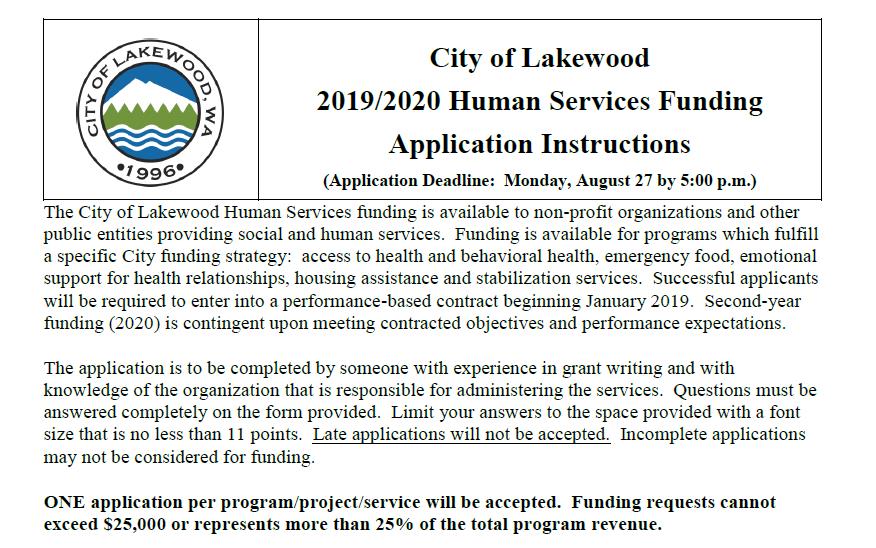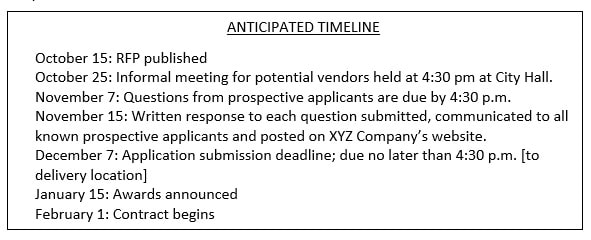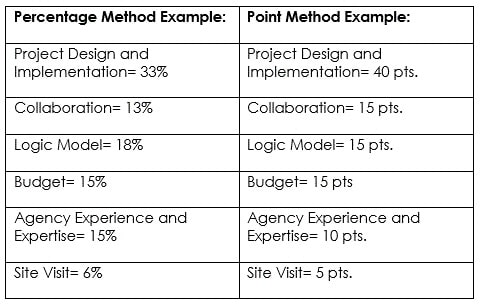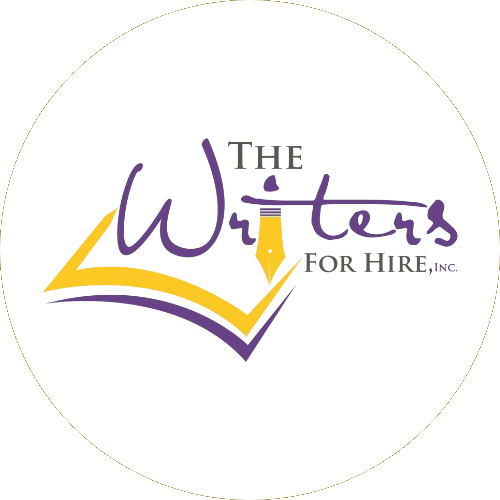How to Easily Craft an RFP Solicitation to Attract the Best Vendors to Your Business
January 19, 2019
Oftentimes, getting the right vendors to work with your company is a critical part of your business success. But how do you attract high-quality vendors to provide you with the services and supplies you need?
An RFP solicitation can be key in attracting the right suppliers to help your company achieve its goals. And whether it’s for your own business or the company you work for, at some point an RFP procurement process might be considered and an RFP document will need to be written.
I need to write an RFP and I’ve never done one before. HELP!
What exactly is an RFP?
A Request for Proposal, known as an RFP, is a document issued by a private company or public agency to potential vendors for products or services they need. It is a detailed, formal, and specific process to award a contract to procure these products and/or services based on the scope of work and, in many cases, the best price. The process is transparent and competitive in nature, and in the case of government agencies, they are required to issue such bids publicly to ensure fairness and prevent biased or insider bidding.
An RFP is typically issued when the project requirements have a value of $25,000 or more and when the selection of a vendor cannot be made completely on the lowest price but must also consider the most cost-effective solution to the company’s needs. It is important to note that unless explicitly stated otherwise within your RFP solicitation, an RFP is binding and functions as your intent to make an award and the selected vendor’s intent to sign a contract.
5 Core Factors to Identify Before Writing your RFP
Before you even start to write your RFP solicitation, you need to decide some key points. Deciding on these points will make the writing easier and give you a better understanding of the reason for the solicitation.
1. What is the purpose of your RFP?
What does your company need? Once you’re clear on this, you can articulate the purpose behind the solicitation and write the first pages of your document. If you can write this purpose in a paragraph, then it will be easy for potential vendors to determine if the RFP is worth their time and effort. Doing it in a sentence or two is even better. Some examples of this could be:
“XYZ Company needs to purchase 1,000,000 processors that will help us in the manufacturing of our new supercomputers that will be sold to ABC company. These processors must be at the best price of no more than $1,000 per unit.”
“XYZ Company needs to construct 1,500 new high-end, high-efficiency housing units on currently owned property. These units will be a mix of single-family homes, duplexes, and apartment complexes. We will be hiring a well-established, local contractor to construct these units.”
2. What is the main scope of work you want accomplished once the contract is awarded?
Understanding this will help you know exactly what your expectations are and will help you write the actual “Scope of Work” section of your RFP. These are the details of what needs to be done within the job itself. The more details you can identify in this section, the easier it is to explain what is expected of potential vendors who apply. Will the vendor be providing for the whole project or just parts of it – and what part? Will there be subcontractors, or will you be doing a sole-source award where you are hiring only one vendor vs. several vendors?
3. What is your company’s timeline?
When figuring out the timeline, you need to project from when you want to get the project started to when you want it finished. You also need to factor in time for writing and releasing your RFP and time for applicants to respond. The best way to plan out your timeline is to work backward from the project completion date. If you need the project to be completed within a year, then you need to identify how long the project will take once you hire a vendor; how long the RFP application process will take, including any preliminary vendor meetings and question/answer periods; how long the evaluation and award period will take; and how long it will take to write and publish the RFP. It’s critical that you give applicants adequate time to receive, review, and respond to your RFP. If your deadline is unrealistic, then you run the risk of not getting the quality vendors and responses you need.
4. How in-depth or detailed do you need the responses from applicants to be?
What is the bare minimum of information you need from applicants to allow your company to make the best, most-informed decision to award the contract? Identify what information is critical for your company to know about the vendors and don’t get bogged down in information that is not necessary. If your project is smaller or is based mostly on the cost of service or goods vs. quality, or what scope of work is being provided, then the information you need from potential vendors might be minimal. But if you have a large project or need, or if you are looking to hire more than one vendor, then you will need more information to make an informed choice. Figuring this out first will help you explain within the RFP what information applicants need to provide.
5. What are you looking for in a vendor?
Each responding vendor will have different strengths and weaknesses. Some will focus on lowest cost. Others will focus on the best quality. And others will offer a complete set of features the others didn’t. Some vendors will be new and others will have more experience in the services or products you need. It helps to decide up front what you’re looking for in a vendor. Is it the lowest cost, the fastest delivery, or some combination of the two? Do you want a vendor you can work with long-term beyond the contract period? What’s their experience level? Decide what a successful vendor looks like to your company and your project’s needs. Doing this will help you understand more of what is important to you and will help you identify your evaluation methods once you get to that stage of the RFP process.
12 Sections of a Quality RFP Solicitation

While 12 sections to an RFP may seem like a lot, you want to provide each applicant with enough information, leaving no room for their own personal interpretation. Your document should be structured in a way that clearly and concisely presents your needs to the applicant. Of course, each type of solicitation will be different, depending on your company’s needs, but the following outlines the standard sections that should be included in most RFPs.
Formatting your document using these 12 key sections will get you organized, keep you from forgetting any important information, and help you write your RFP with ease.
1. Introduction and Background:
Very similar to an Executive Summary, this is where you explain who your company is and the reason for the RFP solicitation. Give a brief overview to potential vendors, not just of your company’s background, products or services, and your target audience/market, but also the requirements of your needs. If you have any budget or service number requirements, you can also include them here.
2. Company Contact Information:
Potential vendors who want to apply for your opportunity will need all the necessary contact information for your company. Provide your company’s mailing and/or delivery address, phone number, and the name of the person managing the RFP process. You want to make it easy for applicants to reach your company, and the right contact person, with any questions they have. You also want them to know where to submit their RFP response. Include this information early in the document, both on the cover page and at the front of the solicitation, so it is readily available.
3. Timing:
Often, there are several timing issues involved in the RFP solicitation process. These could include the date the solicitation is published, any informal meetings you will offer to potential vendors to discuss the process, a question and answer period, the deadline for response submissions, and when the decision and award will be made. Create a timeline and make it easy to read and understand. Also, place this early in your solicitation so applicants can gauge how quickly they must respond and if they have the time and resources to actually apply for your opportunity. Remember to make your timing reasonable and try to give your prospects enough time to prepare a well-thought-out response. Your timeline could look like this:

4. Pre-Bid Questions and Answers:
Will you provide a question and answer period to potential applicants? Will you offer an informational meeting or an application workshop to go over the process in-depth? Or will this all be left up to the interpretation of each vendor? This section tells applicants what support they can expect from you during the process. Depending on the nature of the RFP solicitation and what your company needs, you may or may not offer this to applicants. If you do, explain the how, when, and why here. An example of what you might say:
“An informal RFP meeting will take place on Wednesday, October 25, 2018, at City Hall to discuss the process. XYZ Company will also be open to written questions about the RFP process submitted to Cindy@XYZCompany.com from October 20 to November 7, 2018, no later than 5 pm.”
5. Format of Responses:
Explain here exactly how you want proposals to be formatted and organized for submission. If you don’t clearly explain this, you run the risk of getting responses in many different formats, making it harder to evaluate them. Highlight items like font size, margin width, the total number of allowed pages, the number of copies to submit, and how to organize the components of the document, including any attachments. This way you get a cohesive response from each applicant.
It is actually quite common for applicant proposals to get disqualified from evaluation for not following these simple rules. While it is certainly at your company’s discretion, many larger companies or government agencies do this regularly because it helps identify the vendors who follow directions, which is important if they end up being the awarded vendor. You could potentially get dozens of proposals, so disqualifying applicants for not adhering to the requirements lessens the number of proposals to evaluate. Emphasize within your solicitation that applicants pay close attention to identified formats and requirements and mention the chance of disqualification in case of non-compliance.
6. Submission of Information:
Think of this as the how, where, and when that potential applicants need to know. While some of this information was already included at the beginning of your document, you want to reiterate this information so there is no question about the submission process. Will you only accept online submissions? Hand delivered? Where do the responses have to be delivered to and by when? Include an actual day, date, and closing time and whether you will accept any late submissions. Have a way to track submissions that come in. Be clear so there is no disputing a late application and the process is fair to all applicants. You might write in this section:
“All RFP responses are due on [the day and date specified] and may be hand-delivered or mailed to [your identified address] addressed to [name of person managing the RFP process]. The date and time of all received bids will be noted and then all bids will be reviewed to ensure they meet all requirements and are responsive. All responsive bids will be scored according to the categories below. Successful applicants will be notified by [confirm the timeline date].”
7. Scope of Work:
In the introduction section of your RFP you touched briefly on your company’s needs and why you’re hiring a vendor, so here you would go into more detail about the scope of work to be provided or performed as well as the quantified service or product deliverables. This would be the place for your clearly stated technical specifications and service or product requirements.
Examples of what you might include in the scope of work section could be the service or product outputs or service levels, delivery information, timelines for the deliverables, what costs are reimbursable, travel expenses, equipment provisions, licensing rights, upgrade or modification costs, necessary reporting, and any other requirements to carry out the contract by both your company and the awarded vendor.
8. Requested Information:
This is the bones of your RFP document. This is the section that needs to detail clearly what information you need and want from your applicants. This section could include:
• The applicant’s basic information (name, contacts)
• Their background/history/accomplishments/experience as it relates to the RFP’s stated work and goals
• The work the applicant plans to perform as outlined in your RFP
• Their goals/objectives/deliverables for the project
• How they will perform the work
• Their timeline as it relates to the project and scope of work
• Their evaluation methods and reporting for the work they will be performing
• Their proposed budget, costs, pricing formats, and budget narrative for the project or work to be performed
• Any other information or attachments that you may want to include as it relates to the project
Of course, you can include less of this information, all of this information, or other identified items related to your project. Use this as a guideline and you’ll find it easier to outline and write your RFP to attract the best responses to your company.
9. Evaluation Methods:
Once you receive the RFP responses from qualified applicants, then what? This is where you detail to potential vendors how you will evaluate their responses and how you will, in essence, “grade” them and select the winning proposal(s). The evaluation criteria are the factors you identify to judge the proposals as to how they would best meet the needs of your company.
Ultimately, there are three reasons to include your proposal evaluation methods within your RFP: It gives applicants an equitable way to have their proposals reviewed without a question as to fairness; it allows applicants to see the most important areas of the RFP; and it allows your proposal evaluators to have a clear method for reviewing applicants’ offers and easily ranking the proposals accordingly.
While you can write your RFP solicitation to have whatever clear and reasonable evaluation methods you deem best, most RFP evaluation criteria are weighted by a point or percentage system, decreasing to the least important factors. They also should be clear and realistic as they relate to the solicitation.

It is also a good idea to include a sentence such as, “The winning vendor will be selected solely by the judgment of XYZ Company and XYZ Company reserves the right at its sole discretion to reject any and all proposals received without penalty and to not issue a contract as a result of this RFP.”
10. Notification of Award to Applicants:
Let your applicants know when and how they will be notified of the award decision. You can offer a simple award/decline letter to each potential vendor who responded, or you can publish a more formal letter announcing the winners of the RFP to all applicants. Include when that letter will be published or sent out to applicants.
11. Contract Information:
This section can include the more technical and legal items associated with your RFP. Consider including a sample contract that you intend to use with successful applicants; the terms, conditions, and monitoring of the project; and timelines associated with the actual project itself once an award is made. Include anything the applicant needs to know to make an informed choice on whether or not your project is a good fit for them. This could also include information on insurance and bonding requirements, penalties for late performance, invoicing, payments, and reimbursements.
12. Cover Page and Letter:
Finally, compose a cover page and a cover letter (optional) summarizing your RFP and including all contact information before publishing it online or sending it out to potential vendors or applicants. Use company letterhead and make it professional. Add a table of contents as well. Examples of good cover pages and cover letters can be found at:
http://www.nyc.gov/html/sbs/downloads/word/Sample_RFP_Cover_Ltr_2011.doc
Wrapping It All Up
There are many ways to write a good, clear, and concise RFP that will attract quality vendors to your project. But use this as a guideline to help you write it faster and with ease, especially if you’ve never written an RFP solicitation before.
And one final reminder: Be sure to give yourself plenty of time in your procurement process to start the RFP document and give applicants time to review your RFP, collect their information, and prepare a response.
If you’re unsure if an RFP solicitation is the document that will suit your company’s needs, read about how to write an RFQ or RFI as well.
































Nice Article
Lorem ipsum dolor sit amet, consectetur adipiscing elit. Suspendisse turpis est, gravida at iaculis vel, tempor sed risus. Suspendisse faucibus elementum turpis. In mollis accumsan metus. Mauris convallis velit non urna molestie accumsan. Sed maximus ipsum eu varius luctus. In non justo sapien. Nulla facilisi. Curabitur eget iaculis arcu, ut suscipit nisi.